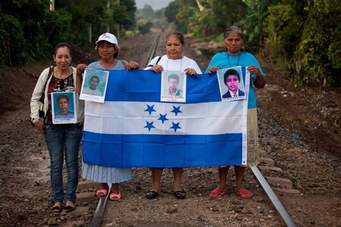by the El Reportero’s wire services
The 11th Caravan of Mothers of Migrants “We need all,” which calls for missing children that cross into Mexico, moves today from the country’s southern region.
These are women from Guatemala, El Salvador, Honduras and Nicaragua, who arrived in here carrying photographs of their children hung on the chest.
They were received by Brother Tomás González Castillo, coordinator of “La 72” migrant shelter, located in the municipal seat of Tenosique, bordering Guatemala, in the southeastern state of Tabasco.
The caravan consists of 43 people, mostly mothers who come in search of their children, who hoped to reach illegally the United States, and it is expected they were killed on Mexican soil.
Relatives of those missing were presented in the offices of the National Institute of Migration, located in the city of Tenosique, first place of their trip to Mexico, La Jornada newspaper reported.
In that city, the members of the caravan submitted documents to process their stay in this country, where they aim to claim for their relatives in several states of the Mexican nation.
AIDS affecting Mexican adolescents
The AIDS epidemics each time affecting more Latin American people, is also affecting Mexican adolescents, alerted an expert from the Mexican government in occassion of commemorating the World Fighting Day against AIDS.
One Third of Honduran HIV Patients without Antiretroviral Therapy
Thirty-four percent of the total of registered cases, corresponds to people from 15 to 29 years old, added expert Patricia Uribe, director of the Center of Aids Control and Prevention of Mexico (Censida), who stated that these adolescents did not live on the years in which the illness was in its rise, so it is more difficult for them to learn about the risk to receive the infection.
They are the most vulnerable to infection, accounting for 20 percent of AIDS cases in Mexico, while 37 percent of new infections are reported each year are 15 to 29 years.
Meanwhile, Javier Dominguez, in charge of the office of the Population Fund United Nations in Mexico, said that this sector is more disadvantaged against HIV / AIDS for reasons such as violence and limited access to health services.
The most suffering people from this evil come from places where poverty and marginalization as is the case of Chiapas, with 42 percent of AIDS cases in females and Guerrero (35.6), Veracruz (35, 4), Oaxaca (33.4) and Tabasco (32.3).
Also the epidemic of HIV/AIDS is growing among Mexican women and is at high risk for dozens of newborns, said Patricia Volkow, an expert from the Faculty of Medicine of the National Autonomous University of Mexico.
She also referred to that in 2014 more than 100 children were born infected with this virus and in the course of 2015 90 cases were recorded.
The Agency for the Prohibition of Nuclear Weapons in Latin America and the Caribbean (Opanal) held here the 24th regular session of its General Conference, said sources today.
The Mexican Ministry of Foreign Affairs said in a communique that the forum was attended by representatives of African countries, observer countries and representatives of international organizations and civil society.
During the conference, Brazil, Guatemala and Peru were chosen as new members of the Opanal Council, while Chile and Mexico were re-elected for four more years in the Committee on Contributions and Administrative and Budgetary Matters (CCAAP).
It also agreed to begin preparations for the celebration of the 50 years of the Treaty of Tlatelolco, to be held in this city on Feb. 14, 2017.
Opanal was established by the Treaty for the Prohibition of Nuclear Weapons in Latin America and the Caribbean, known as the Treaty of Tlatelolco, in 1967.



